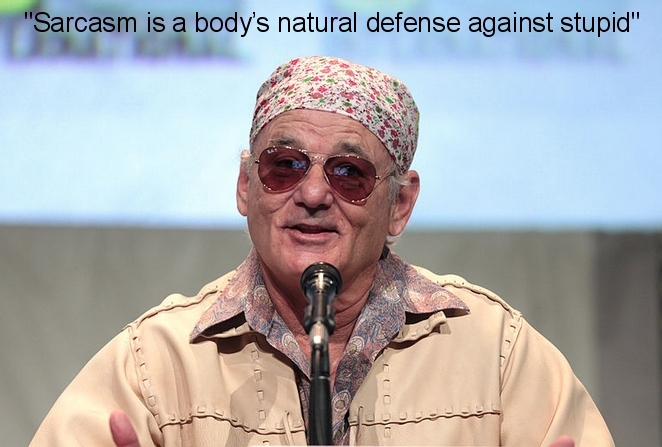Underlying image by Gage Skidmore.
Echoing Bill Murray, the Urban Dictionary defines sarcasm as “your body’s natural defense against stupid,” noting that it’s “the highest form of wit” in countries like the UK, but the lowest in America, owing to the population’s inability to detect whether or not one is being sarcastic.
Example:
Idiot: I beat up a ten-year-old today.
You: (with a hint of sarcasm) That’s impressive!
Idiot: I know, right!
A new study by Francesca Gino, Adam Galinsky, and Li Huang, of Harvard, Columbia and INSEAD business schools, respectively, suggests that the use of sarcasm promotes creativity for those on the giving and receiving end of sarcastic exchanges.
Gino told the Harvard Gazette, “To create or decode sarcasm, both the expressers and recipients of sarcasm need to overcome the contradiction (i.e., psychological distance) between the literal and actual meanings of the sarcastic expressions. This is a process that activates and is facilitated by abstraction, which in turn promotes creative thinking.”
Galinsky added, the givers and receivers in sarcastic exchanges “subsequently performed better on creativity tasks than those in the sincere conditions or the control condition. This suggests that sarcasm has the potential to catalyze creativity in everyone.” “That being said, although not the focus of our research, it is possible that naturally creative people are also more likely to use sarcasm, making it an outcome instead of [a] cause in this relationship.”
The evidence certainly seems solid in the hands of master practitioners such as Louis CK, Sarah Silverman, and the staff of The Onion, not to mention newcomer Shirley Jester, an animated Sarcastic Foul-Mouthed Teenage Comedian Girl from the Renaissance.
Things get a bit murkier when amateurs attempt to adopt their idols’ caustic poses. Tone and intent are easily misconstrued. Feelings get hurt.
Is sarcasm best left to the professionals?
Not necessarily. Gino and Galinksy found that the degree of trust between expresser and recipient determines how sarcasm is received. In other words, know your audience.
Even at its meanest, sarcasm—from the Greek and Latin for “to tear flesh”—involves abstraction, a hallmark of creative thinking.
Meanwhile, you can review Clinical Psychologist Chris Fulton’s “Try that again method,” below, one of many strategies for handling “sarcastic and sassy teenagers.” Creativity be squelched.
Cue a million teenage eye rolls, and check out Gino and Galinksy’s findings here.
Related Content:
John Cleese’s Philosophy of Creativity: Creating Oases for Childlike Play
The Most “Intellectual Jokes”: Our Favorite Open Culture Reader Submissions



Since most people on the East Coast are sarcastic, these findings from East Coast
Institutions are more than predictable.
Spot on Bill. West Coast folks are like, so superior!